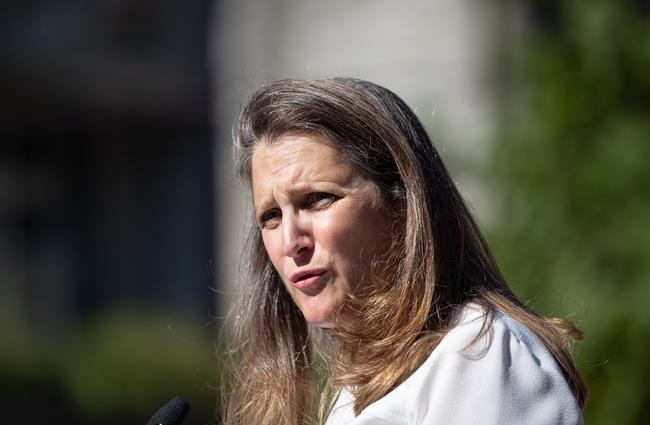REGINA — Saskatchewan has become the latest jurisdiction to sign on to the federal government's plan to implement $10-a-day childcare for families.
"A child-care centre is as important to our economy, it is as much a piece of critical infrastructure as a bridge, a road and a grain elevator," Deputy Prime Minister Chrystia Freeland said Friday in Regina.
Freeland said the Liberal government is committing nearly $1.1 billion to Saskatchewan over the next five years.
The $10-a-day child care is to be implemented in the province by the end of 2026 at the latest, and a 50 per cent reduction in fees is expected by the end of next year. The money will also help create 28,000 new regulated early learning and child-care spaces.
Federal officials have been travelling the country in recent weeks, announcing agreements with some provinces and territories to create a national child-care system. Saskatchewan's government is the eighth to join and the third conservative-led province in the group.
Freeland said the closing of schools and child-care centres due to the COVID-19 pandemic drove women’s participation in the labour force down to its lowest level in two decades.
Ahmed Hussen, federal minister of families, children and social development, said the pandemic has pushed the long-standing issue into clear view.
"Parents, especially mothers, have had to make the difficult choice between going back to work to provide for their children and staying home to care for them," he said. "How is that a choice?
"We all know that before the pandemic, the early learning and child-care sector right across our country was already undergoing tremendous challenges — high fees, lack of affordable spaces, long wait-lists — childcare that simply did not meet the needs of all children."
Freeland said affordable childcare will support women returning to work and help the economy recover, citing studies that show that every dollar invested in early childhood education returns between $1.50 and $2.80 to the economy.
With Saskatchewan signing on, Freeland said the program covers nearly half of Canadian children.
Canada has previously signed child-care deals with Manitoba, Quebec, British Columbia, Nova Scotia, Yukon, Prince Edward Island, and Newfoundland and Labrador.
Freeland said she's confident the other provinces and territories will eventually sign onto the plan.
Across Canada, the federal government said it plans to spend up to $30 billion on childcare over five years, and $9.2 billion per year after that.
The co-operation between provincial and federal governments underscores the importance of early child-care education throughout the country, she said.
"We don’t agree on everything with the government of Saskatchewan," she said. "We’re friends today, but there are a whole lot of issues where we are not a hundred per cent aligned. But … we are a hundred per cent aligned on early learning and childcare.
"This is a breakthrough moment in Canada where early learning and childcare has ceased to be a partisan issue."
Federal officials have said increased wages for educators is a sticking point for some of the jurisdictions that are still in negotiations.
Saskatchewan has committed to creating a wage grid that officials said will ensure early childhood educators are well paid. Saskatchewan Education Minister Dustin Duncan said wages need to reflect the hard work educators do.
This report by The Canadian Press was first published Aug. 13, 2021.
Julia Peterson, The Canadian Press



